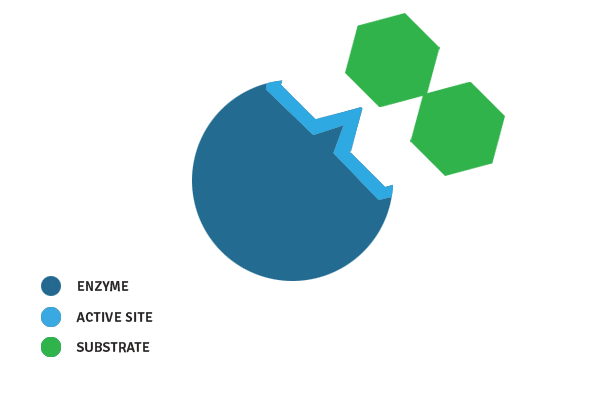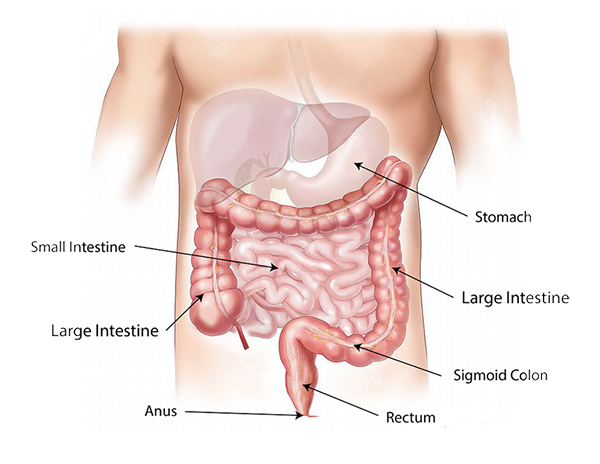The Short Answer:
Table of Contents
- What are Enzymes?
- What are Digestive Enzymes?
- Complete list of Digestive Enzymes
- Digestive Enzymes and Weight Loss
- Do Lipase Inhibitors Assist with Weight Loss?
- What’s the difference Between Probiotics and Digestive Enzymes?
- Side effects
- Who Should Take Digestive Enzymes
- How to Take Digestive Enzymes
- The Best Digestive Enzymes for Weight Loss and Digestive Health
- Summary
Despite the fact that the digestive enzyme supplement market is growing at a rate faster than the entire supplement industry as a whole most people don’t completely understand how they work and their potential impact on weight loss.
In the following article, we are going to take a closer look at digestive enzymes, with a focus on their ability to help people lose weight.

What are Enzymes?
Before we investigate digestive enzymes, and their impact on weight loss it’s helpful to understand what enzymes are and the role they play in the body.
Firstly, enzymes are not living organisms. They are organic materials made by living things, but as they cannot replicate themselves, they are not a ‘living’ organism.
While enzymes are available in supplement form, they are extracted from raw foods and can be plant-based or sourced from animal products. They are however not active in foods once cooked. While all enzymes have specific heat tolerances, as a general rule once the temperature exceeds 140 degrees, enzymes become inactive.
Enzymes are of course, also produced naturally by the human body and located within our cells.
You may have heard the names of some enzymes before but didn’t realize what they were. For example, enzymes have the letters ‘ase’ suffixed after them e.g. Protease , Amylase , and Lipase .
Enzymes play a crucial role in how our body’s function, they do this by increasing the rate of chemical reactions that occur within the human body. While it’s true that these chemical reactions could occur without the help of enzymes, they would occur too slowly to support life.
Chemical Reactions in the Body
We run on chemical reactions. Chemical reactions happen when two molecules interact.
You can think of enzymes as docking stations for molecules. Enzymes facilitate chemical reactions through a region known as the active site. The active site allows enzymes to bind to compatible molecules, known as substrates. The binding process facilitates the fundamental interaction required for the chemical change to occur.
The following animation demonstrates how this takes place using the binding methods known as the ‘lock and key model.’

- In the first stage of the animation, the compatible substrate is near the active site of the enzyme. As you can see Structurally, the enzyme and substrate are compatible.
- The second stage shows the compatible substrate binding with the enzyme, allowing the chemical reaction to take place.
- The third step of the animation shows the now modified substrate. In this particular example, the chemical reaction results in the substrate being broken down, leading to the creation of two new molecules, known as ‘the product.’
Another model of binding, referred to as the induced fit model , results in the substrate and enzyme undergoing structural changes when in proximity to each other to allow for the binding process to take place.
Types of Chemical Reactions
In the animation above, the chemical reaction taking place is the breaking down of the substrate. A chemical breakdown is just one example of a chemical reaction. Other examples include two separate substrates combining. In all cases, the chemical reaction results in chemical bonds being broken or created.
For the enzyme itself, these reactions are temporary. After the chemical reaction is complete, the enzyme will return to its original state, while the substrate has undergone modification.
A practical example of the importance of enzymes is the condition known as Lactose Intolerance.
In the case of a person who is lactose intolerant, their bodies are unable to produce ‘Lactase’ the enzyme responsible for separating the substrate, ‘Lactose’ (milk sugars) into glucose and galactose molecules resulting in a significantly reduced ability to digest milk sugars.
The example above is just one type of chemical reaction, in reality, there are millions of chemical reactions occurring in your body. These chemical reactions are collectively known as your metabolism.
What are Digestive Enzymes?

Digestive enzymes, unsurprisingly are the enzymes responsible for breaking down the food that we consume. While many digestive enzymes are residing in our cells, we can categorize them into four primary classes:
- Protease: The digestive enzyme responsible for breaking down proteins into amino acids.
- Amylase: The digestive enzyme responsible for breaking down carbohydrates into blood sugars.
- Lipase: The digestive enzyme responsible for breaking down fats into fatty acids and cholesterol.
- Nuclease: The digestive enzyme responsible for splitting nucleotides in nucleic acids into smaller units. Nucleotides are the building blocks of DNA.
Once broken down these nutrients are then able to be absorbed by the human body and used for a range of purposes, including providing energy and rebuilding the body, including the production of new enzymes.
Unsurprisingly, naturally occurring digestive enzymes are found in the primary areas of digestion in the human body (mouth, stomach, pancreas and small intestine) with the majority of absorption taking place in the small intestine.

Digestive Enzymes of the Mouth
Chemical digestion of food begins in the mouth. Salivary glands found beneath and at the back of our tongues excrete approximately 1.5L of saliva per day . Contained within this saliva are the enzymes that break down Carbohydrates and Fats.
Because we swallow our food quickly, only limited chemical digestion can occur ( mechanical digestion takes place in the form of chewing), but as our food mixes with saliva, the enzymes continue to aid in digestion.
The Digestive Enzymes of the Stomach
Our stomachs play a significant role in digesting our food. Gastric Enzymes are found within the stomach and include the enzyme Pepsin.
Pepsin: Pepsin is converted from Pepsinogen thanks in large part to Hydrochloric Acid produced by the cells of the stomach. Once converted to Pepsin, it becomes the chief gastric enzyme and breaks down proteins into amino acids. While Fats and Carbohydrate chemical digestion begin in the mouth, chemical Protein digestion starts in the stomach.
[box type=”info” size=”large” style=”rounded”]Yes, it’s true Hydrochloric Acid is produced by the cells of the stomach. However, our stomach lining consists of mucus which protects the stomach. Electrolytes contained inside this layer of mucus neutralize the Hydrochloric Acid if penetration of the mucus occurs. Hydrochloric Acid’s primary purpose in digestion is to remove any bacteria remaining in our food as it enters the stomach.[/box]The Digestive Enzymes of the Pancreas
Sitting to the rear of the stomach and attached to the Duodenum (the first section of the small intestine) is the Pancreas. The Pancreas is the primary digestive gland of the human body, and its main task is to produce enzymes.
The other function of the Pancreas is to create hormones that regulate metabolism.
The Digestive Enzymes of the Small Intestine
Most absorption of the nutrients extracted from our food occurs in the small intestine after being broken down firstly by the mouth and secondly by the stomach, where the majority of digestion takes place.
Most enzymes found in the small intestine are secreted by the Pancreas, entering the small intestine via the pancreatic duct.
Complete list of Digestive Enzymes
| Enzyme | Location | Class | Resulting Product |
|---|---|---|---|
|
Lingual Lipase
|
Mouth (The tongue) | Lipase | Fatty acids |
| Salivary Amylase | Mouth (Salivary glands) | Amylase | Sugars |
| Gastric Lipase |
Stomach
|
Lipase | Fatty acids |
| Pepsin | Stomach | Protease | Peptides |
| Carboxypeptidase | Pancreas | Protease | Amino Acids |
| Chymotrypsin | Pancreas | Protease | Amino Acids |
| Deoxyribonuclease | Pancreas | Nucleotide | Nucleotides |
|
Elastase
|
Pancreas | Protease | Peptides |
|
Pancreatic Amylase
|
Pancreas | Amylase | Sugars |
| Pancreatic Lipase | Pancreas | Lipase | Fatty Acids |
|
Ribonuclease
|
Pancreas | Nucleotide | Nucleotides |
| Trypsin | Pancreas | Protease | Peptides |
| Aminopeptidase | Small Intestine | Protease | Amino Acids & Peptides |
| Dipeptidase | Small Intestine | Protease | Amino Acids |
| Enterokinase | Small Intestine | Protease | Trypsin |
| Lactase | Small Intestine | Amylase | Glucose and Galactose |
|
Maltase
|
Small Intestine | Amylase | Glucose |
| Nucleosidases & Phosphatases | Small Intestine | Nucleotide | Phosphates |
| Sucrase | Small Intestine | Amylase | Glucose & Fructose |
| α-Dextrinase | Small Intestine | Amylase | Glucose |
Digestive Enzymes and Weight Loss
Now that we understand how enzymes work and their role in digestion we can focus on the question at hand, regarding digestive enzymes and weight loss.
There’s little doubt that digestive enzymes will help you eradicate waste from your system resulting in temporary weight loss. Weight loss over the long-term as a result of taking a digestive enzyme, however, is a little more complicated.
While there is conflicting information on the benefits of digestive enzymes and weight loss, the truth is, both arguments can be correct depending on your approach to nutrition.
The simple fact is; however, enzymes are not a magic bullet for weight loss. However, it is also true that incomplete digestion can be one of the leading causes of weight gain .
As digestive enzymes assist with the breaking down of nutrients, helping you to absorb more nutrients from your food. Depending on the foods you consume this can either assist with weight loss or help you put on weight faster.
If your diet is poor, enzymes won’t help with weight loss. If on the other hand you eat plenty of nutritious whole foods and limit your intake of unhealthy foods e.g. sugary carbohydrates, you can expect to benefit even more from the nutrients in your food.
In the majority of cases, someone who is overweight will experience low energy levels, will often feel bloated and complain of having a slow metabolism. If your digestive system is not operating optimally, digestive enzymes can assist with all three of these factors.
In any case, a holistic approach to weight loss is always the best approach, and additional supplements are merely tools that can assist but should never be relied upon too heavily.
Remember, approaching weight loss with the mindset of taking in fewer calories may work for a short time, but long-term is not an efficient method. It is far more beneficial to create the correct environment within your body to burn fat.
Digestive enzymes can certainly help in this regard, provided your body requires assistance with the digestion of the foods you consume.
Do Lipase Inhibitors Assist with Weight Loss?
You may have heard claims that scientists have discovered the on/off switch for Lipase enzymes and how this has the potential to be a breakthrough for weight loss .
Orlistat, an over the counter medication is arguably the most well known Lipase Inhibitor. Lipase inhibitors, as the name suggests block Lipase in the small intestine. They do this by binding to Lipase enzymes and limiting their activity.
As we have previously discussed Lipase is essential for breaking down fats into fatty acids. If we restrict the activity of Lipase Enzymes in the body, then it stands to reason that we will absorb less dietary fat. Because (as a result of the Lipase Inhibitor) dietary fat is unable to be digested it is expelled as waste.
Studies have shown that Lipid inhibitors can aid with weight loss but not in a significant way . The other aspect to consider is once you stop taking a lipase inhibitor, the weight is relatively easy to put back on.
To summarize, Lipase Inhibitors can help people lose weight but in the majority of cases are not as effective as diet and exercise.
What’s the difference Between Probiotics and Digestive Enzymes?
 As we have previously learned, enzymes are not living organisms, and their primary purpose is to help break down foods allowing more efficient absorption.
As we have previously learned, enzymes are not living organisms, and their primary purpose is to help break down foods allowing more efficient absorption.
Probiotics, on the other hand, are live bacteria that line the digestive tract and aid absorption along with a host of other digestive system benefits including:
- Improving digestive system efficiency
- Destroying bacteria that creates bad breath
- Increased energy due to the production of B12
- Helps develop the immune system
However as Probiotics are living organisms, they are destroyed by toxins, prescription antibiotics, and even stress.
Side effects
Are Enzymes Dangerous?
Enzymes are considered non-toxic and safe for human consumption as they are present in many of the foods we consume.
However, there is growing evidence to support the fact that the more we rely on digestive enzyme supplements, the less our bodies will produce them naturally. While this is considered reversible, In essence, it is possible for your body to develop a dependency .
It is known that once we reach the age of 40 and above our production of digestive enzymes decreases by up to 25% (due to organ deterioration). It is also thought that as we age congestion of the bile ducts that excrete bile containing enzymes increases resulting in less efficient delivery of enzymes to the small intestine.
Are Digestive Enzymes safe for Diabetics?
Diabetes is a condition which results in the body being unable to produce or respond adequately to the hormone Insulin which results in the body being unable to metabolize blood sugar. Diabetes can also impact Protein and Fat digestion.
As a result, the three primary Enzymes (Protease, Lipase, and Amylase) can all play a role in managing diabetes as they will aid in digestion and ultimately absorption.
However, it’s also important to understand that particularly in the case of Amylase (the enzyme responsible for breaking down sugars) this can result in a blood sugar spike, particularly if you are already taking medication for Diabetes.
Please, keep in mind Diabetes is a serious condition and any change in diet or an addition of a supplement should always begin with a consultation with your doctor who knows your medical history.
Are Digestive Enzymes Safe for Pregnancy?
 As digestive enzyme supplements are extracted from raw foods, enzyme supplements are thought to be no more dangerous than consuming the food the enzyme is derived from in its natural form.
As digestive enzyme supplements are extracted from raw foods, enzyme supplements are thought to be no more dangerous than consuming the food the enzyme is derived from in its natural form.
While it’s important to consult with your doctor if pregnant, before taking supplements of any kind, enzyme supplements are not considered dangerous for pregnant women, although there are conflicting reports on how effective they are for treating side effects of pregnancy including bloating and heartburn.
Who Should Take Digestive Enzymes
Typically, digestive enzymes are recommended for those experiencing any of the following conditions that indicate digestive issues:
- Undigested food in your stools (particularly fatty substances)
- Experiencing frequent bloating or gas
- Constipation and indigestion
- Always feeling full despite eating only small amounts of food
- Suffering from Leaky Gut Syndrome
If you are unsure, the safest way to test the health of your digestive system is to request a stool sample from your doctor.
How to Take Digestive Enzymes
In the majority of cases, it is best to take a digestive enzyme with food. They are available in either tablet or capsule form and can be taken with food or before or after a meal. If you prefer to add them directly to your food capsules are a better option as the enzymes can be extracted from the capsule and added directly to your meal.
Tablets, on the other hand, will not dissolve until they reach your lower intestine.
Digestive enzymes work by interacting with the food you are consuming so it’s imperative that they are taken within a short time before, after or during the consumption of food.
Digestive enzymes dosages are based on the types of food you are consuming rather than simply your age and weight. Because of this, you may be required to try different doses to test how effective they are for your particular situation.
If after a few weeks you do not see any positive benefits, I’d suggest consulting with your pharmacist and trying an alternative brand.
If you are taking a digestive enzyme to treat a condition such as Leaky Gut Syndrome, you may discover as your health improves, that you require a smaller dose over time.
The Best Digestive Enzymes for Weight Loss and Digestive Health
While you can certainly obtain enzymes from raw foods including fruit and vegetables, supplements provide a much higher concentration. There is also the fact that as soon as you cook vegetables, the enzymes contained within becoming inactive.
As previously mentioned, you won’t find a digestive enzyme supplement specifically designed for weight loss. Maintaining a healthy weight is a by-product of good digestive health, a healthy diet, and an active lifestyle.
Enzymes can certainly be of benefit however if you are experiencing poor digestive health but unless you take a holistic approach to weight loss , you shouldn’t expect to see anything more than short-term results.
Plant-based V animal sourced
We recommend if purchasing a digestive enzyme supplement to stick to plant based options. While animal based digestive supplements are available, they are less efficient in the stomach due to the acidic nature of the stomach (animal based enzymes are not effective in an acidic environment) thanks to the presence of Hydrochloric Acid. Plant-based enzymes, on the other hand, are active across a broad range of PH levels making them a more viable option.
Summary
As we have discovered during this article, enzymes while not directly affecting weight can aid in digestive health in those people who are experiencing digestive issues. As we know, poor digestion is a leading contributor to weight gain, so in many cases, digestive enzymes and weight loss can work hand in hand.
If however you are experiencing digestive health issues and you are noticing symptoms of your food not digesting completely, your first port of call should always be your doctor.
